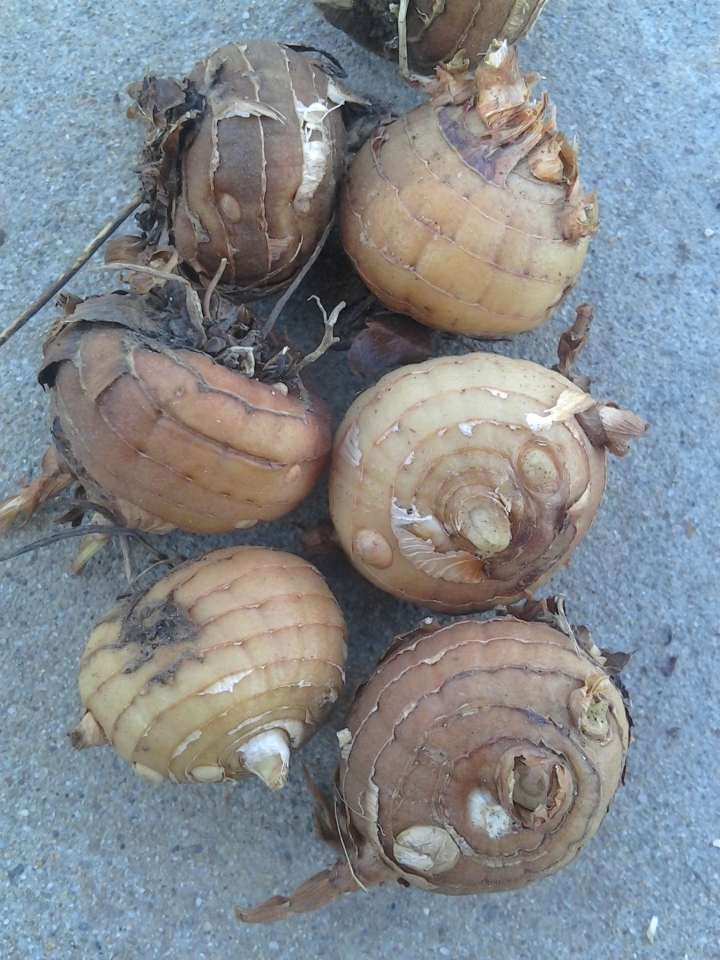 After working so hard to bloom so impressively in spring or summer, bulbs redirect their efforts into saving up their energy for winter dormancy. That is why their fading foliage lingers after faded flowers get pruned away. The foliage eventually dries and deteriorates, leaving plumped dormant bulbs to overwinter underground. It is all their natural life cycle.
After working so hard to bloom so impressively in spring or summer, bulbs redirect their efforts into saving up their energy for winter dormancy. That is why their fading foliage lingers after faded flowers get pruned away. The foliage eventually dries and deteriorates, leaving plumped dormant bulbs to overwinter underground. It is all their natural life cycle.
However, to bloom well the following spring, many bulbs need to be chilled while dormant. Such bulbs are from cooler climates. The chill convinces them that it really is winter, and that it will be safe to bloom when weather gets warmer in spring. They can get rather confused without adequate chill. Some may never bloom as well as they did their first spring.
Tulip, hyacinth, lily, anemone and ranunculus are probably the best examples of the worst perennial bulbs. Technically, they are perennials. Where winters are cooler, they may naturalize and bloom every spring. Here, winters are just too mild. They bloom very impressively in their first spring, but rarely bloom as well the second spring, and only if pampered.
Narcissus, daffodil, grape hyacinth and bearded iris are much more reliable. Crocus and freesia are a bit more demanding, but can be reliable if they get what they want. Montbretia and crocosmia are reliable enough to become invasive. Gladiola and dahlia, which are not quite as reliable as crocus, are summer bulbs, so get planted a bit later.
Of course not all bulbs are true bulbs. Some are corms, rhizomes, tubers or tuberous roots. Some get planted deeply. Bearded iris and a few others get planted shallowly. A few others do best in pots. In their first year, some bulbs can be planted in phases so that they bloom in phases the following spring. However, all bulbs of each type will synchronize by their second year.
Anemone, ranunculus and bearded iris bloom too synchronously to be phased. No matter when they get planted, each type blooms at the same time. However, some bearded iris bloom as early as the earliest of daffodil, and others bloom late. Some even bloom twice!
Once again, great information, Tony. Here of course, in Maine, we are very lucky with many of the bulbs you mentioned due to our winter temps being as they are. No confusion about a ‘ great chill’! Often, customers are surprised when we explain to them that many of the pots we fill here, which can often be filled with spring bulbs or even herbaceous perennials, need to be left out in order to go through that cold dormancy period. We are more concerned with the pot not surviving the deep freeze, very rarely the plant.
LikeLiked by 2 people
That is a difficult concept for some, perhaps more so in milder climates. Those in Southern California do not think of our mild frosts as a good thing that makes it possible for us to grow apples and pears. They get a slight chill, so can grow apricots, peaches and other stone fruit, but even that is marginal. They do not understand the importance of frost to some plants.
LikeLiked by 1 person
I have just received my autumn planting bulbs here in Spain. Alliums and freesias. Which Did so well here last year. In London I have received my tulip bulbs.
The tulips didn’t do so well here last year so I’m notbbothering again!
Do you grow alliums there?
LikeLiked by 1 person
Alliums are popular in other gardens, but not mine. They are not my style. There are other bulbs that I would prefer. However, if I find that they naturalize in other gardens, I will eventually try some of the smaller types.
LikeLike
Thank you Tony for all the interesting info. I always learn something from your posts and am sorry that I cannot often make comment. I usually only have time for a careful read and no more time for a thoughtful reply. It is really interesting too because you are writing from your experience in an entirely different climate from us in southern Ontario but often with similar or the same plant species. Keep these fine blogs coming, they are most appreciated and thanks again.
LikeLiked by 1 person
Oh, you are certainly not obligated to reply. I am pleased that you like them. I have been writhing my gardening column for twenty years, but newspapers are not what they used to be.
LikeLike